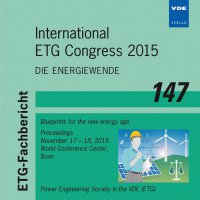Increasing the hosting capacity of RES in distribution grids by active power control
Konferenz: International ETG Congress 2015 - Die Energiewende - Blueprints for the new energy age
17.11.2015 - 18.11.2015 in Bonn, Germany
Tagungsband: International ETG Congress 2015
Seiten: 7Sprache: EnglischTyp: PDF
Persönliche VDE-Mitglieder erhalten auf diesen Artikel 10% Rabatt
Autoren:
Larscheid, Patrick; Maercks, Moritz; Dierkes, Sebastian; Moser, Albert (RWTH Aachen/IAEW, Aachen, Germany)
Patzack, Soeren; Vennegeerts, Hendrik (FGH e.V., Aachen, Germany)
Rolink, Johannes; Wieben, Enno (EWE AG, Oldenburg, Germany)
Inhalt:
Due to the increase of renewable energy sources in Germany, distribution grids are operated closer to their technical limits. In order to organise the required grid expansion more efficiently, innovative technologies and operational concepts like feed-in management are increasingly discussed. The aim of this paper is to quantify the potential of different feed-in management strategies in order to increase the hosting capacity of distribution grids in Germany. Taking into account the heterogeneity of German distribution grids, synthetic distribution grids are generated considering regional dependencies. The applied Monte Carlo simulation ensures the consideration of general correlations and different specific circumstances in respect to grid and load structure as well as generation. Based on the synthetic distribution grids, the potential of three different feed-in management strategies is examined: An intelligent feed-in management strategy, a general feed-in limitation and a combination of both strategies. The results demonstrate the effectivity of all regarded feed-in management strategies. It is shown that by implementing an intelligent feed-in management strategy the hosting capacity can be increased more significantly in comparison to general feed-in limitation and combined feed-in management. In terms of the total wasted energy both intelligent and combined feed-in management strategies demonstrate a more efficient performance than general feed-in limitation. A regional evaluation of the Germany-wide examination results illustrates that within photovoltaic dominated regions more feed-in management is necessary than in wind power dominated regions.


